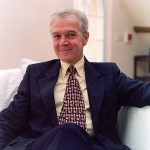Professor Michael Mingos
Honorary Fellow
Mike Mingos’ ancestors settled in the Middle East in the last quarter of the 19th Century when it was still part of the Ottoman Empire. They were civil engineers and doctors who had migrated from Greece and India and lived and pursued their careers in Beirut, Baghdad and Alexandria.
His grandfather was a civil engineer and oversaw the building of some of the modern bridges over the Tigris and Euphrates. Michael Mingos was born in Basrah in 1944 and lived in Iraq and Iran. After his father decided to follow his journalistic career in Athens without the family in 1947 he migrated with his mother and sister to the British Isles in 1950 on the SS Albistan, a cargo ship, which spent 30 days sailing between Basrah and Cork, Ireland. He was naturalised as a British subject in 1957, and his previous nationality was officially recorded as “unknown” – not a surprising conclusion given the geopolitical boundary changes in the Middle East between 1875 and 1950.
His family settled in Folkestone in Kent and he attended a Catholic Primary School and scraped through the 11 plus examination to gain a place at Harvey Grammar School. He failed to make a mark academically and did not trouble those who had to organise the prize giving days. He was an undergraduate at Manchester University and completed his doctorate at Sussex University under the supervision of Professor Joseph Chatt FRS. He then spent 2 years at Northwestern University on a Fulbright Fellowship and a year at Sussex on an ICI Fellowship. His first academic post was at Queen Mary College, University of London in 1971 and in 1976 he was appointed a Lecturer in Chemistry at the University of Oxford and Fellow of Keble College. From 1992-1999 he held the Sir Edward Frankland BP Professorship in Inorganic Chemistry at Imperial College London and was appointed Principal of St Edmund Hall in 1999.
His research career as an inorganic chemist at London and Oxford Universities led to an international reputation that is based on major contributions to several areas. Fellow academic chemists will know him for his inventive syntheses of new compounds of the transition metals and particularly cluster compounds. The principles he developed in 1980s were rediscovered in the last two decades by chemists and physicists who have sought to develop nanoclusters and colloids of the platinum and coinage metals for their interesting electronic and biochemical properties. Undergraduates associate him with the development of theoretical models and electron counting rules, which relate the structures of cluster compounds to the total number of valence electrons. The Wade-Mingos Rules are pillars of inorganic courses worldwide. Industrial chemists in the pharmaceutical and ceramics industries recognise his major role in promoting the application of microwave dielectric heating for accelerating chemical reactions and studying catalytic processes under microwave conditions. Those interested in developing “molecular machines” will be aware of his analysis of hydrogen bonding and aurophilic interactions which have defined molecular recognition principles in co-ordination compounds and resulted in complexes which may be used for anion binding and form the basis of the characterisation of a unique self assembled gold catenane. In a world of increasing specialisation his major contributions to chemistry have resulted from the intelligent application of a wide range of techniques (synthetic chemistry, spectroscopy, X-ray crystallography, theoretical chemistry) to make novel compounds with interesting structural features. These results have then been skillfully weaved by him into new models, which allowed chemists to unify and rationalise their results and thereby stimulate further new developments. The Blaise Pascal Medal awarded in 2017 captured his essence in the following statement “Professor Mingos is an intellectual giant who has made transformative changes right across the area of inorganic and structural chemistry throughout his distinguished career”.
In addition to his research contributions Professor Mingos has always shown a great interest in chemical education and communication. He has published many reviews, a monograph on cluster chemistry and undergraduate textbooks, and has served on the editorial boards of many journals. He was Regional Editor of Journal of Organometallic Chemistry from 1996 to 2005, Managing Editor of Structure and Bonding and co-editor, with Robert Crabtree, of Comprehensive Organometallic Chemistry. He was elected a Fellow of the Royal Society (FRS) in 1992. He holds Honorary Doctorates at Manchester and Sussex Universities, has been awarded numerous prizes and has presented named lectureships in many universities worldwide.
View Professor Mingos’ full CV here and his Publication List here.

Professor Michael Mingos
MA, (BSc Manc, DPhil Sus), FRS, CChem, FRSC
- Honorary Fellow